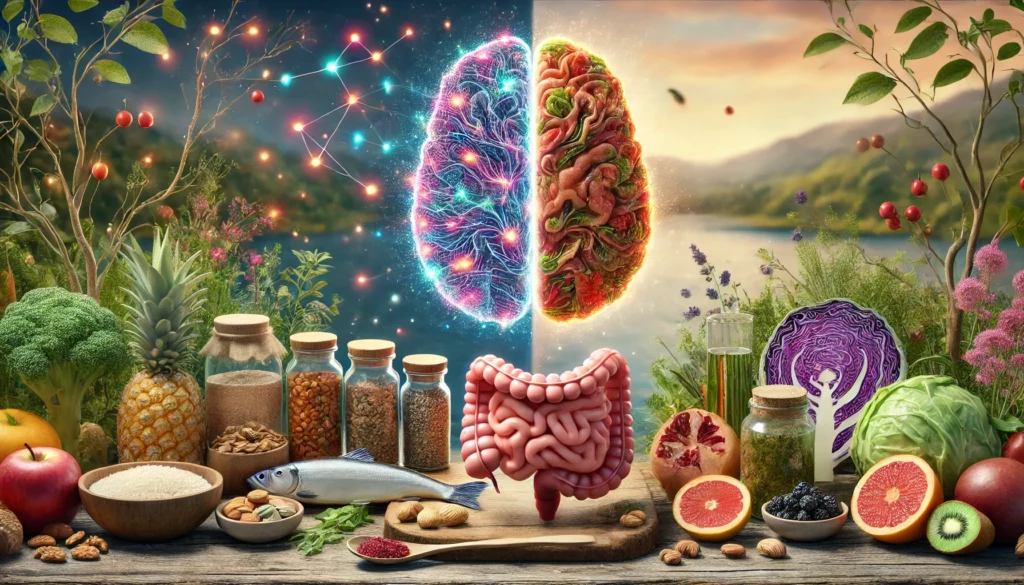
1️⃣ Introduction
Mental disorders such as bipolar and unipolar disorders are complex conditions influenced by genetic, neurobiological, and environmental factors. Recent research suggests that, in addition to the classical neurotransmitter theory, the gut-brain axis and nutrition play a crucial role. Moreover, an individual’s personality structure impacts the course of the disorder and the response to different therapeutic approaches. This report explores the interactions between these factors and their relevance to understanding and treating affective disorders.
2️⃣ Personality Structure and Affective Disorders
A person’s personality structure can influence how bipolar or unipolar disorders manifest and how individuals cope with their condition. Research highlights specific personality traits associated with affective disorders:
- Neuroticism: Increased emotional instability, heightened stress response, and susceptibility to anxiety and depression.
- Perfectionism: Can be both a protective and risk factor, depending on its flexibility or rigidity.
- Impulsivity (in bipolar disorder): Particularly prominent during hypomanic or manic phases, affecting social and occupational life.
- Introversion vs. Extraversion: Depressive individuals tend to lean toward introversion, whereas manic episodes are often accompanied by extroverted behavior.
- Self-esteem regulation: Difficulties with self-acceptance can contribute to severe mood swings.
3️⃣ The Gut-Brain Axis as a Key to Emotional Health
The gut-brain axis refers to the bidirectional communication between the brain and gut microbiome. Imbalances in the gut can trigger inflammatory responses that contribute to neuroinflammation, exacerbating mood fluctuations.
🔬 Biochemical Mechanisms:
- Microbiota Interaction: Specific bacterial strains influence the production of serotonin, dopamine, and GABA.
- Chronic Inflammation: A disrupted gut flora can lead to the release of pro-inflammatory cytokines, intensifying depressive symptoms.
- Leaky Gut Syndrome: A compromised intestinal barrier can allow toxins into the bloodstream, burdening the nervous system and worsening psychological symptoms.
4️⃣ Nutrition as a Therapeutic Factor
A well-balanced diet can play a crucial role in stabilizing mood and supporting the gut-brain axis.
🍎 Dietary Strategies to Support Mental Health:
✅ Omega-3 Fatty Acids (Fish, Flaxseeds, Walnuts): Enhance brain function and have anti-inflammatory properties. ✅ Fermented Foods (Yogurt, Kimchi, Sauerkraut): Promote a healthy gut microbiome. ✅ Tryptophan-rich Foods (Bananas, Nuts, Eggs): Support serotonin production. ✅ Polyphenols (Berries, Green Tea, Dark Chocolate): Have neuroprotective effects. ✅ Magnesium (Spinach, Almonds, Avocados): Helps with stress regulation and muscle relaxation.
5️⃣ Scientific Insights and Therapeutic Approaches
- Studies confirm that individuals with bipolar or unipolar disorders often exhibit altered gut microbiota.
- Nutritional psychology and gut therapy are gaining relevance in psychiatric treatment.
- Personalized dietary plans can enhance the effectiveness of conventional therapies such as medication and psychotherapy.
- Probiotics and prebiotics show promising effects in stabilizing mood.
6️⃣ Conclusion
The interactions between personality structure, the gut-brain axis, and nutrition offer new perspectives for treating bipolar and unipolar disorders. A holistic therapy approach that incorporates psychotherapy, medication, gut health, and a balanced diet could contribute to better symptom control and improved quality of life in the long term.